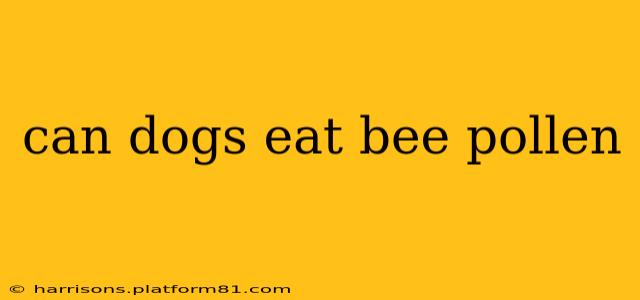Bee pollen, a nutritional powerhouse for humans, often sparks curiosity among pet owners: can dogs safely consume it? The short answer is nuanced. While bee pollen offers potential benefits, it also carries risks, making informed decision-making crucial for responsible pet ownership. This guide explores the topic in detail, addressing common concerns and providing valuable insights.
Is Bee Pollen Safe for Dogs?
The safety of bee pollen for dogs depends on several factors, including the dog's individual health, the amount consumed, and the quality of the pollen. Generally, small amounts of bee pollen are unlikely to cause serious harm to a healthy dog. However, introducing it gradually and monitoring your dog closely is essential. Always opt for high-quality, pure bee pollen, free from pesticides and other contaminants.
Potential Benefits of Bee Pollen for Dogs
Some pet owners believe bee pollen can offer several benefits to their canine companions. These purported advantages include:
- Increased Energy Levels: Bee pollen is rich in vitamins and minerals, which some believe can boost energy levels in dogs, particularly older ones or those recovering from illness.
- Improved Coat Health: The nutrients in bee pollen might contribute to a shinier, healthier coat.
- Enhanced Immune System: Bee pollen is packed with antioxidants and other compounds that could potentially support the immune system.
- Improved Digestion: Some anecdotal evidence suggests bee pollen can aid digestion in certain dogs.
Potential Risks and Side Effects of Bee Pollen for Dogs
Despite the potential benefits, several risks are associated with feeding bee pollen to dogs:
- Allergic Reactions: Dogs, like humans, can be allergic to bee pollen. Symptoms can range from mild (itching, hives) to severe (anaphylaxis). Introducing bee pollen gradually and observing your dog closely for any adverse reactions is crucial.
- Gastrointestinal Upset: Bee pollen can cause diarrhea, vomiting, or other gastrointestinal distress, particularly if consumed in large quantities.
- Contamination: Bee pollen can be contaminated with pesticides, herbicides, or other harmful substances if not sourced responsibly. Choosing high-quality, reputable brands is paramount.
- Interactions with Medications: Bee pollen may interact negatively with certain medications your dog is taking. Always consult your veterinarian before introducing bee pollen, especially if your dog is on any medication.
How Much Bee Pollen Can a Dog Eat?
There's no universally agreed-upon safe dosage of bee pollen for dogs. The amount depends on factors such as the dog's size, breed, and health status. Always start with a tiny amount—a pinch—and observe your dog closely for any adverse reactions. If no adverse reactions occur, you can gradually increase the amount over several days, but keep it minimal. A veterinarian can provide guidance on an appropriate amount based on your dog's specific needs.
What if My Dog Eats Bee Pollen?
If your dog has ingested a small amount of bee pollen and shows no signs of distress, close monitoring is recommended. However, if your dog exhibits any symptoms of an allergic reaction (such as difficulty breathing, swelling, or hives), seek immediate veterinary attention. If you suspect your dog has consumed a large quantity of bee pollen or is showing signs of gastrointestinal upset, contact your veterinarian as well.
Should I Give My Dog Bee Pollen?
The decision of whether or not to feed your dog bee pollen is ultimately yours. However, it's crucial to weigh the potential benefits against the risks. Always prioritize your dog's safety and well-being. Consult your veterinarian before introducing bee pollen or any new supplement to your dog's diet. They can provide personalized advice based on your dog's individual health needs and circumstances. Remember, a balanced, nutritious diet is the cornerstone of canine health. Bee pollen should be considered a supplement, not a replacement for a complete and balanced diet.
